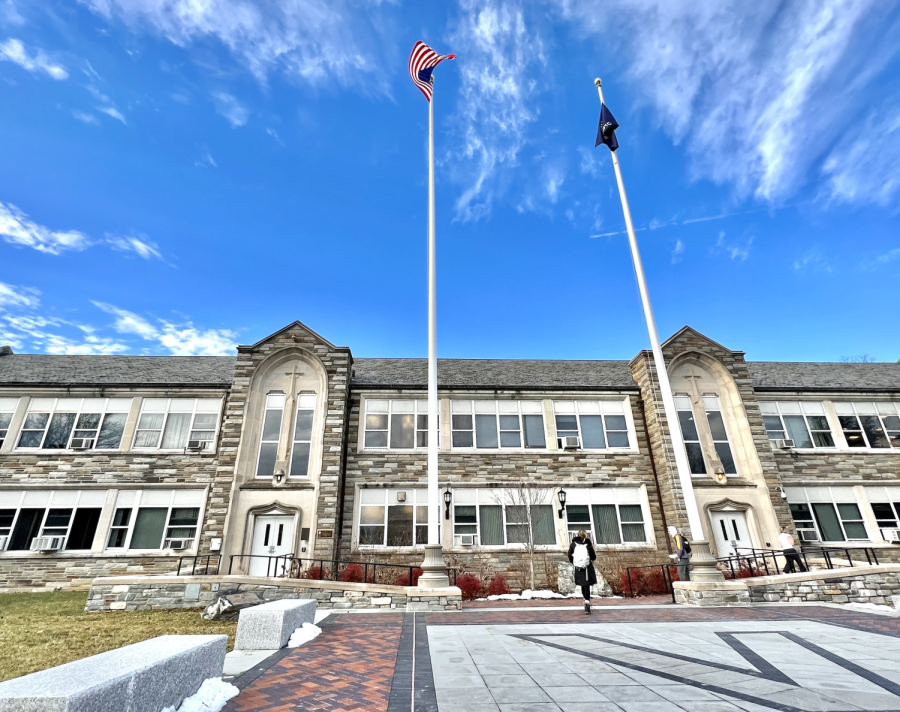John Barry’s Slave Ownership Means His Hall Must Be Renamed
Olivia Pasquale / Villanovan Photography
John Barry Hall was built in 1947 and named after the now-controversial Commodore Barry.
September 21, 2022
There is no question that establishments, specifically universities, are struggling with the effects of naming buildings after something with a controversial history. In the wake of the initial Black Lives Matter movement, there has also been the argument of what to do with Confederate statues. Both names of slave holders and statues of Confederates aid in commemorating an era in which racism ran rampant. Many people who oppose changing the names of buildings like to argue that it is erasing history. However, there is a very important distinction between continuing to celebrate an offensive history versus acknowledging and teaching the wrongs of the past.
John Barry Hall, which one may be familiar with as home to the ROTC or because it is where calculus class takes place, is named after Commodore John Barry. The hall was built in 1947 under then University president, Father Stanford. Barry was deemed the “Father” of the American Navy during the American Revolutionary War era. Commodore John Barry was a senior officer of the navy, a great war strategist and an owner of enslaved people.
Located not only in Barry’s personal estate, but also in his will, is the statement of his ownership of “1 bound black girl,” and “1 bound black boy.” Their names were Judith and James Barry. In his will, Barry claimed that he would transfer the ownership of Judith and James to his wife until she remarried or died.
All conversations from Villanova surrounding Commodore Barry are only in regards to the hall and celebrations of his achievements. There is an important way to acknowledge and teach the wrongs of history in a way that does not celebrate it with statues and commemorations. The University needs to take note of other universities’ actions and stop celebrating the history of buildings like John Barry Hall.
There is a new movement on campus to #RenameJohnBarryHall. One of the founders of this movement is sophomore Marche Walter.
“With Villanova shifting part of its focus to becoming a more inclusive and diverse campus, buildings such as John Barry Hall prohibits us from moving forward as a community and setting forth the change we want to see,” Walter said. “Here, we have classes such as ‘IGR: Intergroup Dialogue’ and ‘Social Justice and Inclusivity Communitas’ that discuss the different identities we share and help broaden our knowledge about certain social issues. However, we are still ignorant of the culture and history of some of the buildings and people we idealize on our campus. The #RenameJohnBarryHall movement is about reflecting a change that embodies our Augustinian values of Caritas, Unitas and Veritas.”
The #RenameJohnBarryHall movement group will be meeting for the first time next Friday, Sept. 23 at 5 p.m., location to be determined.
The University has issued the following response to concerns about the naming of John Barry Hall: “John Barry Hall was built to house Villanova University’s Naval ROTC unit and opened in 1949. It was named in honor of Commodore John Barry, the Irish-born naval commander widely known as ‘Father of the American Navy.’ Commodore Barry has been commemorated across the country for his contributions and military service, including with a statue outside Independence Hall in Philadelphia and a bridge spanning the Delaware River. We have been made aware of questions about Commodore Barry’s history and are looking into it.”
As a university that prides itself on Caritas, Unitas and Veritas, it is important to not only talk about these characteristics but to act on them as well. Conversations are equally as important in talking about history, and until now, no one has talked about John Barry Hall. It is difficult to determine if this fact has simply never been brought to light or if it has been continuously ignored for nearly 75 years of Villanova’s history.
In a message from University President Rev. Peter M. Donohue, O.S.A., Ph.D., on May 29, 2020, he discussed the then recent events of COVID-19 and the death of George Floyd.
“I call on all of us to look honestly at ourselves and see the times when our actions, interactions and reactions fall short of our best intentions,” he said. “We need to examine where we have succeeded, where we have failed and where we can actively work together to improve—and commit to improving. … We need to reach out beyond our comfort zone and engage in conversations on important subjects that matter.”
Let us all – students, faculty and Villanova community members – take the advice of Father Peter and commit to making Villanova a more inclusive space for everyone.



No • Sep 21, 2022 at 3:05 pm
Convenient time to hold the meeting. Directly conflicts with NROTC’s Fall Parade.